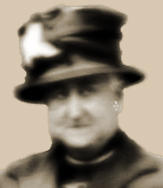Lady Bracknell learns that she is a hypocrip
Regular readers will be aware that the glaziers visited Bracknell Towers on Friday last for the purposes of replacing the broken pane in the withdrawing room window. Despite the assiduous laying down, and taking up, of dust sheets, the carpet remained sprinkled with tiny shards of broken glass.
It being the servants’ weekend off, Lady Bracknell, in contravention of the direct orders given to her by the osteopathic gentleman, decided to wield the vacuum cleaning device in a staunch, if somewhat amateur, manner. She reasoned that the risk to her lower back thus engendered would be of a lesser magnitude than the potential damage to her own – or to her feline companion’s - feet, should either of them tread unwittingly on the splinters of glass.
It was not until some hours later that the protestations of Lady Bracknell’s back and hip against being so abominably ill-used were felt to their fullest extent. As a consequence, Lady Bracknell slept but little, and has therefore struggled to retain her wonted fortitude of spirit.
In correspondence with her great friend, Viscount Biscuit, Lady Bracknell admitted the error of her ways. The Viscount rightly chided her ladyship for treating her impairment in such a cavalier manner. Almost with the same breath, however, he admitted that he has taken similar risks himself, and branded himself a hypocrip.
Having given the matter some thought, Lady Bracknell is forced to the reluctant conclusion that she too is a hypocrip. On very many occasions, she has advised such of her intimate acquaintances who are somewhat frail themselves to take great care; to do everything in their power to avoid exacerbating the effects of their impairments unnecessarily; and to refrain absolutely from returning to their place of employment until such time as they are entirely fit to do so. This advice has always been sincerely meant, and Lady Bracknell believes it to be both sound and sensible. And yet frequently, when it comes to her own person, she flagrantly ignores its precepts.
Furthermore, when Lady Bracknell contrasts the advice given to her by her enfeebled friends with their frankly reckless approach towards their own impairments, she has no option but to recognise that each and every one of them is, to a greater or lesser extent, a dyed-in-the-wool hypocrip.
Readers who are themselves physically frail, and who feel qualified to offer a rational explanation for this universal tendency of their peers towards hypocriptical behaviour, are warmly invited to submit their theories via the “comments” facility.

(“Viscount Biscuit” is, of course, merely a nom de web. The particulars of the gentleman in question’s true identity are, however, entirely safe with Lady Bracknell.)
It being the servants’ weekend off, Lady Bracknell, in contravention of the direct orders given to her by the osteopathic gentleman, decided to wield the vacuum cleaning device in a staunch, if somewhat amateur, manner. She reasoned that the risk to her lower back thus engendered would be of a lesser magnitude than the potential damage to her own – or to her feline companion’s - feet, should either of them tread unwittingly on the splinters of glass.
It was not until some hours later that the protestations of Lady Bracknell’s back and hip against being so abominably ill-used were felt to their fullest extent. As a consequence, Lady Bracknell slept but little, and has therefore struggled to retain her wonted fortitude of spirit.
In correspondence with her great friend, Viscount Biscuit, Lady Bracknell admitted the error of her ways. The Viscount rightly chided her ladyship for treating her impairment in such a cavalier manner. Almost with the same breath, however, he admitted that he has taken similar risks himself, and branded himself a hypocrip.
Having given the matter some thought, Lady Bracknell is forced to the reluctant conclusion that she too is a hypocrip. On very many occasions, she has advised such of her intimate acquaintances who are somewhat frail themselves to take great care; to do everything in their power to avoid exacerbating the effects of their impairments unnecessarily; and to refrain absolutely from returning to their place of employment until such time as they are entirely fit to do so. This advice has always been sincerely meant, and Lady Bracknell believes it to be both sound and sensible. And yet frequently, when it comes to her own person, she flagrantly ignores its precepts.
Furthermore, when Lady Bracknell contrasts the advice given to her by her enfeebled friends with their frankly reckless approach towards their own impairments, she has no option but to recognise that each and every one of them is, to a greater or lesser extent, a dyed-in-the-wool hypocrip.
Readers who are themselves physically frail, and who feel qualified to offer a rational explanation for this universal tendency of their peers towards hypocriptical behaviour, are warmly invited to submit their theories via the “comments” facility.

(“Viscount Biscuit” is, of course, merely a nom de web. The particulars of the gentleman in question’s true identity are, however, entirely safe with Lady Bracknell.)











3 Comments:
Recently I found myself called upon to give some written advice to two young persons who had been diagnosed with what persons of Lady Bracknell's generation would know as atypical polio. I composed a lengthy letter - eight pages - read it over and wondered why on Earth I didn't ever take my own advice.
Psychology describes a phenomenon called The Optimistic Bias. This is the failure on the part of the individual to apply what they know, usually about an issue of health, to their own situation. Most often this is studied in groups participating in high-risk behaviour such as intravenous drug use or binge-drinking.
When asked to reason, an individual will explain why they personally are immune to the particular risks that they acknowledge exist for others. Often these explanations are quite fanciful. I believe it is such irrational optimism which made her ladyship briefly defy her well-established hoover-intolerance.
However, the Optimistic Bias plays a useful role elsewhere. In certain tasks, those who believe their chances of success are higher than they would believe were they entirely rational, actually increase their chance of success. In a situation of peril, acknowledging that the odds are against your survival makes death a certainty. If you believe you do have a chance, you will do the things which optimise whatever chance you do have.
And even when it comes to disease outcomes, an irrational belief in a person that they are to be one of the lucky ones may exert some psychosomatic effect.
Like so many of our instincts, it is useful only in a limited set of circumstances. And frankly, a great big pain in the derrière for those in our situation.
Lady Bracknell is, as ever, indebted to the remarkably learned Goldfish for her theories.
In this particular instance, she knew very well that the use of the vacuum cleaning device would not be beneficial but, as Mr Dawson has said, had to weigh that up against the greater and more immediate danger of falling foul of the glass splinters.
Looking at more general instances of her own and others' hypocripsy, Lady Bracknell believes there is more than one factor at work.
Certainly, in the early years after becoming enfeebled, many crips continue to cling to the optimistic bias, and are determined not to let their impairments prevent them from doing all the things which they previously enjoyed.
Following a few "acute episodes" resulting from such foolish behaviour, most will occasionally do things which they know full well to be unwise when their frustration at not being able to do them grows beyond bearing.
Overall, however, Lady Bracknell believes that her desire that her friends will take the advice she gives them grows from the fact that she cares more about the health of those she loves than she does about her own. Lady Bracknell is - whisper it - a bit of a soppy old thing at heart.
Your Ladyship is friends with Viscount Biscuit? Crumbs!
Post a Comment
<< Home